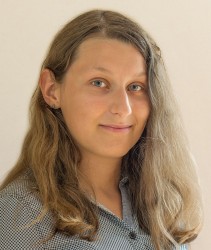Pauline Picot

PhD student in the InSyTE laboratory, University of Technology of Troyes
Pauline Picot is a PhD student in the InSyTE laboratory (Interdisciplinary research on Society-Technology-Environment interactions) at the University of Technology of Troyes. With a background in mechanical engineering and philosophy, she attempts in her PhD to develop an analysis of techniques and their evolutions through the development of the concept of "techno-diversity". This approach is motivated by the constraint that the Anthropocene lays on us and our technologies: succeeding to understand humans and technological actions as part of terrestrial dynamics rather than through the inherited dualist thinking of technique vs. nature, human vs. environment, culture vs. nature, technosphere vs. biosphere. In that aim, "techno-diversity" - to be understood in analogy with "biodiversity" - must bring a thinking of techniques as territorialized, embedded in a natural, social, cultural complex context.
Talk: Post-Growth and Techno-Diversity
The ecological transition requires doing technology otherwise, transforming our current technology, and inventing alternative technologies. That supposes that different technologies are possible, thus that a technological diversity is possible. However, in a context of seeking for growth, technological diversity is often the correlate of innovation, and innovation is seen as a driver toward growth. Thus, on the one hand, valuing and encouraging technological diversity seems necessary to engage in an ecological transition. On the other hand, it appears as the companion of growth. We will try to explore this tension and ask: which technological diversity could be valued to move towards post-growth? After examining how technological diversity is understood nowadays and in which ways this understanding participates in “growthism”, we will propose substituting “technodiversity” for technological diversity. “Technodiversity” will be built in analogy with biodiversity. Firstly, just as biodiversity is a diversity of diversities, “technodiversity” refers to a diversity of diversities that are linked to one another. In this sense, valuing “technodiversity” calls for valuing not growth but relations. Secondly, just as biodiversity is an opening of possibilities for evolution, “technodiversity” suggests aiming for an opening of technological lifecycles, thus for their indetermination instead of a predetermined linear lifecycle ending in closed waste.
Panel Debate: Exploring the future of research and Science: what are the opportunities and challenges of degrowth?
Watch the talk here !
View the slides here !
Our contemporary society has been built and evolved for several centuries in the context of the Holocene. Since the last fifty years, we have entered the Anthropocene, changing the long-term conditions of life on Earth. Yet, even if we can agree on the fact that socio-economic models of Western societies have to evolve to avoid going above planetary boundaries, we rarely discuss the impacts on research and Science if we were to switch for degrowth models. Indeed, if the whole society starts implementing degrowth at a large scale, what would be the implications for research and Science ? In this panel discussion, we will investigate the opportunities and challenges of degrowth on research and academic practices, e.g., at the individual, collective, and institutional level.
In order to generate the questions for the panel, participants will experience a collective intelligence activity known as ``World Cafe''. By proposing several tables of discussion focusing on a specific aspect of the panel topic, this aims at stimulating all participants to actively take part to the debate by formulating key questions together. We will turn the topic upside down by touching upon the KPI in research, the neutrality of Science, or the definition of post-growth research, just to name a few.
In order to generate the questions for the panel, participants will experience a collective intelligence activity known as ``World Cafe''. By proposing several tables of discussion focusing on a specific aspect of the panel topic, this aims at stimulating all participants to actively take part to the debate by formulating key questions together. We will turn the topic upside down by touching upon the KPI in research, the neutrality of Science, or the definition of post-growth research, just to name a few.
Watch the panel here !
